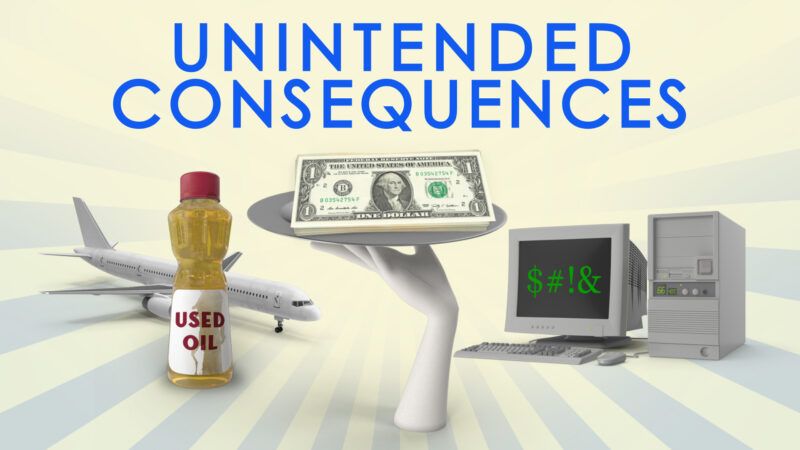Great Moments in Unintended Consequences: Obscenity Blocks, Cooking Oil, and D.C.'s Tipped Minimum Wage (Vol. 19)
Good intentions, bad results.

Great moments in unintended consequences—when something that sounds like a great idea goes horribly wrong. Watch the whole series.
Part One: Bleep Creep
The Year: 1996
The Problem: People on the internet swear too much!
The Solution: A content filter that blocks profane words and naughty letter combinations.
Sounds like a great idea, with the best of intentions. What could possibly go wrong?
Turns out, the English language. The filter started nuking innocent words, like the perfectly respectable town of Scunthorpe, England. When resident Doug Blackie tried to sign up for the service, AOL basically told him to [beep] off.
Their fix? AOL forcibly renamed the town "Sconthorpe," coining a new term: The Scunthorp Problem, which continues to this day forking up small towns, ducking over people with unfortunate surnames, batch-slapping diplomas, Pokemon cards, dog breeds, and even Super Bowl XXX.
Sometimes the dirtiest thing is the filter.
Part Two: Wage Rage
The Year: 2022
The Problem: The base pay for tipped workers in Washington, D.C., is a fraction of the minimum wage, making their income heavily reliant on unpredictable gratuities.
The Solution: Initiative 82, which phases in a higher base wage for tipped workers until it meets D.C.'s full minimum wage in 2027 ($17.95).
Sounds like a great idea, with the best of intentions. What could possibly go wrong?
Turns out, money has to come from somewhere. New labor costs led many restaurants to raise prices, drop staff, cut hours, or close up shop entirely. Many establishments began charging "Initiative 82 fees," which customers found difficult to swallow, especially when Maryland and Virginia are just minutes away. According to the U.S. Census Bureau, the average tipped wage worker in D.C. saw their income drop by over $1,800 in the two years since the initiative went into effect.
Realizing their error, the D.C. City Council repealed the law…partially. Now, the base wage percentage will rise every two years until it reaches 75 percent of the minimum wage in 2034, which sounds like a great idea, with the best of intentions. What could possibly go wrong?
Part Three: Oils Well That Ends Well
The Year: 2023
The Problem: Jet fuel is dirty!
The Solution: Push airlines to use sustainable aviation fuel made from used cooking oil.
Sounds like a great idea, with the best of intentions. What could possibly go wrong?
Turns out, people like money. In places like Malaysia, where fresh cooking oil is subsidized by the government, folks realized their palm oil was worth more used than it was fresh. Suddenly, restaurants with deep fryers were changing their oil more often. Entrepreneurial types started mixing old oil into new oil and called the whole batch used. At some point, why even bother? Fresh oil was simply labeled as used for a tidy profit.
Now, environmentalists warn the scheme could further drive palm oil plantation expansion and subsequent deforestation.
Now that's a slippery slope.
